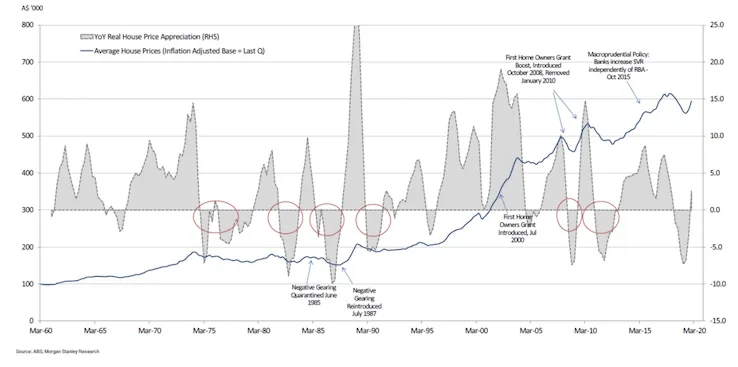5 questions property investors need to ask now


Property expert Rich Harvey takes us through five key factors that investors need to consider before buying or selling in the current market.
In the midst of economic uncertainty and the ongoing COVID-19 situation, many people are asking how the property market will fare. We've seen lots of negative headlines and various experts predict doom and gloom. Many property investors have been hit with having to accept lower rents, or no rent, as tenants have lost their jobs or had reduced income. And the current moratorium on evictions has put some investors in a very difficult position.
No one can predict the exact future of how things will turn out, but there are some fairly reliable indicators you can look for when it comes to deciding whether to invest in property – and when.
We all know (or know of) people who have bought their own home and some investment properties some decades ago and now have millions of dollars of equity behind them. And don't we wish we could have bought back then?
Just like planting a tree, the best time was 20 years ago and the second-best time is now. You can keep putting it off and saying the market is uncertain and it's all too risky, or you can get educated, research the market, get your finances in shape and take prudent steps to move toward your next property investment.
1. With interest rates at ultra-low levels, is property investment still profitable?
Low interest rates have been a key catalyst for property prices rising over the past two decades. We will never again see the eye-watering 17% p.a. interest rates of the early 1990s, as there has been a structural adjustment in rates.
Due to central banks and governments world-wide trying to stimulate spending in their economies, we are in for a long period of low interest rates while we repay excessive government debts and stimulus packages ($220 billion at time of writing).
With interest rates so low, it does not make sense to keep large amounts of cash in the bank. Investing in quality property with potential for strong capital gain and consistent rental income is one key to growing your wealth.
Lower interest rates mean that it is far easier to create a positive cashflow property investment. The challenge here is to not just pick any property because rates are so low, but to carefully select a property that meets specific investment selection criteria.
I personally use a 20 point checklist and examine things such as location attributes, demographics, price trends, rents, vacancy rates, stock levels, amenities, employment, zoning and property attributes. Notice that I put the physical attributes of the property last – it's far more important to get the location right before anything else.
2. What strategies should property investors consider using in today's market?
As the economic recovery from coronavirus may take some time, we can't expect a property boom anytime soon. However, smart property investors can take advantage of a softer market to use these strategies to get ahead:
- Buying a well-positioned property for long term rental and below market value
- Buying and adding value via renovation (i.e. create your own capital growth)
- Buy and add a granny flat for a second income
- Knock down and rebuild
- Build a duplex for two incomes
These are repeatable and safe strategies that you can use to grow your wealth. You don't have to over-analyse 100 strategies to take the first steps toward profitable property investment. In today's market buying a well-located property at a discount for long term is a very smart strategy.
3. What will drive the property market forward?
Property markets change and move in response to a range of macro and micro factors. Three primary drivers that remain highly valid over time are:
- Population and migration. While our borders are temporarily closed, this will negatively impact migration levels, but once we reopen, I believe Australia will pro-actively increase migration to stimulate population growth, and the economy, which will increase housing demand.
- Employment. Australia is a lucky and clever country. Despite unemployment rising during the COVID-19 crisis, we will eventually return to a position of stable employment. Employment growth and stability is a key driver of property demand as buyers seek to obtain loans to further their property aspirations.
- Infrastructure. Highway upgrades, new rail lines, airports, hospitals, schools, universities and port facilities are just some examples of infrastructure projects that stimulate job creation and boost local demand for housing in the areas the projects are located.
Property markets move in cycles – there are times of ups, downs and going sideways. However, the forward indicators on building approvals are showing that we will not be building enough dwellings to satisfy total demand in future years.
Planning laws typically slow and impede the rate at which new dwellings can be approved and built and lack of supply coupled with high demand in some pockets will lead to a very bright future for property investors.
4. What time frame should property investors consider?
Don't look at investing in property unless you are prepared to ride out the cycles. Too many investors are impatient and quit early. High transaction costs mean you should adopt a minimum term of 5 to 7 years and once you have a property, the longer you hold the better in order for the magic of compound capital growth to do its work.
Australian house prices have fared very strongly over the past 60 years, despite all the economic crises of the past few decades (as shown in the chart below). Morgan Stanley Research shows that there's only been 6 occasions where national prices have declined by more than 5% and plenty more times when it's risen well above that.
Housing Prices: The long-term view

5. How can investors start creating a "property portfolio"?
Many of us dream of having a substantial property portfolio, but the most important thing is not the number of properties you own but the NET value of the equity you have in your portfolio.
If you want to start creating a portfolio, the first step is having a stable job with regular income which will enable you to qualify for a loan. Start by building a quality team around you, which could include the following people:
- Mortgage broker
- Buyers' Agent
- Tax accountant
- Depreciation specialist
- Solicitor
- Property Manager
The future of investing in property is still very bright. Don't let media headlines distract you from your long-term goals as property is a proven and resilient asset class that will help you achieve your goals.
Rich Harvey, is a buyers' agent, economist, property investor and CEO of www.propertybuyer.com.au – an independent buyers' agency that specialises in searching, appraising and negotiating real estate exclusively for buyers. Rich and his team at propertybuyer have purchased over 3,000 properties for their clients and won 34 major awards including the prestigious National Telstra Business and National Buyers' Agent "Award for Excellence". Rich has also served as President of the Real Estate Buyers Agent Association of Australia (REBAA) and Chairman of the Buyers Agent Chapter of the Real Estate Institute of NSW to improve the professionalism and standards within the buyers' agents industry.
Disclaimer: The views and opinions expressed in this article (which may be subject to change without notice) are solely those of the author and do not necessarily reflect those of Finder and its employees. The information contained in this article is not intended to be and does not constitute financial advice, investment advice, trading advice or any other advice or recommendation of any sort. Neither the author nor Finder has taken into account your personal circumstances. You should seek professional advice before making any further decisions based on this information.
Read more Finder X columns
-
All the big savings account interest rate rises: ING, AMP, Westpac + more
6 Feb 2026 |
-
Australian credit card debt soars 10% in a year: How can you escape the trap?
6 Feb 2026 |
-
4 cashback home loan offers to ease the pain of RBA rate hike
4 Feb 2026 |
-
Finder’s RBA Survey: Easing cycle ends as RBA delivers first rate hike since 2023
4 Feb 2026 |
-
Ubank Save is increasing its bonus rate up to 5.35% p.a.
3 Feb 2026 |
Images: Getty Images, Supplied
Ask a question
